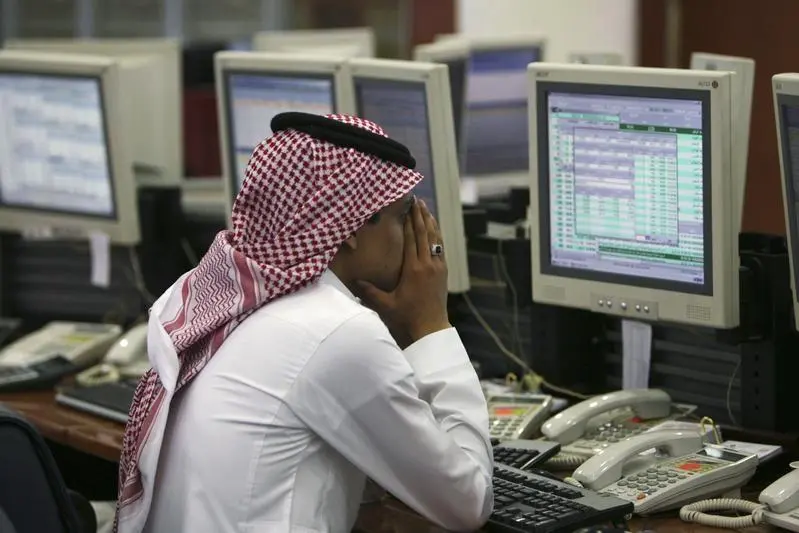PHOTO
* Low oil prices make clear picture of Gulf risks vital
* But irregular, patchy data raise risk premiums
* Saudi slashes original figure for Q4 GDP growth
* Bahrain stops publishing monthly monetary data
* Foreign investment push may cause data to improve
By Andrew Torchia
DUBAI, June 29 (Reuters) - A sharp revision of economic data in Saudi Arabia suggests its economy may be weaker than previously thought, underlining the risks which investors in the Gulf face as they try to estimate the damage caused to the region by low oil prices.
In April, the government's statistics office released data showing gross domestic product grew 3.6 percent in the fourth quarter of 2015 from a year earlier. That was the same as third-quarter growth, implying the economy was coping well with cheap oil.
But this month, the statistics office posted new data revising the fourth-quarter rise to just 1.8 percent - a major slowdown, and one which has some analysts speculating that Saudi Arabia could come close to recession this year.
Unreliable and irregular economic data is a problem for governments and investors in the six nations of the Gulf Cooperation Council as low oil prices put pressure on banking systems and slash state revenues.
During the region's economic boom, which lasted for more than a decade until last year, accurate data often seemed unnecessary. Huge flows of petrodollars eliminated most risks and guaranteed solid growth.
That gave governments little incentive to invest in extensive statistics systems. Oil wealth meant GCC states did not need to levy income or sales taxes, leaving them with less access to data from the private sector that trends in tax receipts would normally provide. Gulf governments' penchant for secrecy may also have played a part.
Now, however, authorities need accurate numbers to make tricky policy decisions. And they have begun borrowing abroad and trying to attract foreign investment to cover deficits caused by oil's drop from $100 a barrel or more two years ago to half that now. It may be harder to do this if foreign investors don't feel they have a clear view of the risks.
"Getting timely data in the GCC is certainly challenging, and disclosure does lag behind many emerging markets," said Razan Nasser, senior economist at HSBC Bank Middle East. "We're in mid-2016 and we still don't have 2015 current, fiscal and national accounts data for some countries in the region."
A portfolio manager at a New York-based hedge fund, declining to be named under his organisation's briefing rules, said the GCC was generally less transparent than other emerging economies which he monitored, and this distorted market prices.
"The lack of clear, reliable data creates more downside risk to my investment so I need to be compensated through an appropriate risk premium," he said. "The less transparent the data, the higher the required risk premium, and I think you definitely see this in the GCC."
TRANSPARENCY
Almost all nations, including developed ones, revise their economic data after the initial release. But the Saudi fourth-quarter change was huge; an OECD study last year found revisions to year-on-year GDP growth rates by 18 member countries rarely exceeded 0.3 percentage point within the following five months.
The Saudi statistics office did not explain the revision, and did not respond to a request for comment on it. The portfolio manager said he believed revisions in the GCC were due to poor data collection, not deliberate manipulation.
There are some strong spots in GCC data; Qatar releases timely and extensive figures, and the Saudi central bank is respected for its money supply numbers. Nevertheless, investors face long delays and patchy coverage in most countries.
The central bank of Bahrain, the GCC country hardest hit by low oil prices, has not published monthly monetary statistics - including for its foreign reserves - since June 2015.
Oman, which has a big fiscal deficit caused by the cheap oil, never published December 2015 figures for public finances. After an unexplained three-month gap, it resumed publishing the data this month. Neither Bahrain's central bank nor Oman's statistics office responded to a request for a comment.
In the absence of good official data, Gulf investors look at proxy signals of economic activity, from car registration figures to monthly passenger traffic through Dubai airport. Late last year, Saudi construction companies' failure to pay tens of thousands of foreign workers indicated the economy wasn't as strong as official figures suggested.
Bond prospectuses can also be revealing. One for a $1 billion international debt issue by state-owned Abu Dhabi National Energy Co this month showed the emirate had posted an $8.8 billion fiscal deficit last year.
There are some signs of improvement; GCC governments established a joint statistical centre in 2011 partly to strengthen data collection in the region. Nasser at HSBC said things should get better in coming years.
"I think as the region taps global markets more for funding and pushes to attract foreign investment, there will be a greater need for them to provide more timely and detailed macroeconomic data." (editing by David Stamp) ((andrew.torchia@thomsonreuters.com; +9715 6681 7277; Reuters Messaging: andrew.torchia.thomsonreuters.com@reuters.net))





















